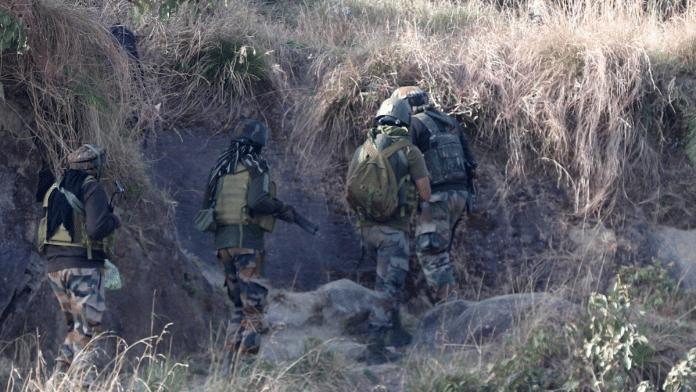New Delhi: The Indian Army has red-flagged what it terms as continued lapses in the security structure along International Border (IB) in the southern sector of Jammu, ThePrint has learnt.
Sources in the defence and security establishment said that what is a point of concern, particularly is the stretch between the Ravi River and the Shakargarh Bulge.
This region, with its broken terrain and dense cover, continues to be exploited by Pakistan-trained terrorists, who infiltrate intending to reignite terrorism in the Jammu sector, the sources said.
They added that the recent patterns have exposed a dangerous operational route frequently used by infiltrators.
“Terrorists are slipping across the IB using terrain gaps, reaching National Highway 44 (a mere 5 to 8 km away), and then vanishing into civilian areas. From there, they manoeuvre through the Banni-Machedi belt, eventually making their way into the thick forests and mountains of Doda and Kishtwar,” one of the sources said, adding that these remote regions serve as ideal hideouts and staging grounds, making detection and elimination operations significantly more difficult.
The sources said that the Army had flagged this to the authorities concerned.
The issue again reared up following the Kathua encounter on Wednesday which claimed the lives of three personnel of the Jammu and Kashmir Police, apart from the elimination of three terrorists by Army units.
The encounter has raised concerns over inter-agency coordination and operational planning, particularly the need to involve Army units at the inception of such complex missions, the sources said.
The operation, conducted in challenging terrain, became riskier because the infiltrated terrorists had already entrenched themselves in remote hideouts, they said.
It is not the first time that terrorists have started exploiting the IB sector, instead of the Line of Control (LoC), which is heavily guarded with a multi-tier security grid.
In 2019, the National Investigation Agency (NIA) had in a report that at least 33 Pakistani terrorists sneaked into India from the Punjab and Samba-Kathua sectors since October 2017.
ThePrint had in July last year reported that about 40 terrorists, mostly from Pakistan-based Jaish-e-Mohammed (JeM), had managed to infiltrate into the Jammu region over the last one year.
Sources in the defence had then admitted that they were taken by surprise with these infiltrations which they suspected happened from the International Border in Punjab, Jammu, besides the LoC under the Nagrota-based 16 Corps.
However, both the Border Security Force (BSF) and the Army, which man the IB and the LoC respectively, denied any kind of infiltration from their areas.
In August last year, the Centre had cut short the tenure of BSF Director General (DG) Nitin Agrawal and his deputy, Special DG (West) Y.B. Khurania, and sent them back to their respective state cadres with immediate effect following the continued infiltration.
As for the IB sector, the sources said a critical vulnerability in this security equation lies in the current deployment and practices of the BSF. There is an urgent need for introspection and course correction, they said.
“Inadequate border domination, and predictable patrolling patterns have allowed both terrorists and smugglers to exploit the gaps with increasing frequency,” a source said.
Compounding the problem is the rampant cross-border drug trade. Confiscation of narcotics in Kathua and Samba districts have become alarmingly frequent, suggesting that smuggling networks are operating with ease, the sources said.
While the BSF has recovered drug consignments being dropped by drones, the sources said that what is caught would be a fraction of what actually comes in.
The recent discovery of several cross-border tunnels in this sector adds weight to fears that both terrorism and narco-terrorism are being facilitated through the same porous points.
The social consequences are equally worrisome, the sources said, adding that drug addiction is rising in the border belt, a clear indication that the menace has penetrated deep into the civilian fabric.
The sources said that the way forward requires a multi-pronged strategy.
“Border domination must be enhanced through smarter patrolling, use of modern surveillance systems, and increased unpredictability in movement. Tunnel detection and interdiction measures need urgent ramping up. The BSF must also enhance synergy with the Army and the Jammu and Kashmir Police, especially for counter-infiltration and intelligence operations,” one of the sources said.
(Edited by Tony Rai)
Also Read: A C-17 landed in Kargil, shrouded in secrecy. Here’s why this is significant






